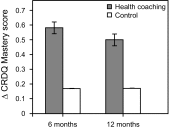Effect of Health Coaching Delivered by a Respiratory Therapist or Nurse on Self-Management Abilities in Severe COPD: Analysis of a Large Randomized Study
- PMID: 30914491
- PMCID: PMC7119186
- DOI: 10.4187/respcare.05927
Effect of Health Coaching Delivered by a Respiratory Therapist or Nurse on Self-Management Abilities in Severe COPD: Analysis of a Large Randomized Study
Abstract
Background: Self-management of patients with COPD has received increasing attention in recent years given its association with improved outcomes. There is a scarcity of feasible interventions that can improve self-management abilities. We recently reported the positive effect of health coaching, started at the time of hospital discharge, on re-hospitalizations and emergency department visits for patients with COPD admitted for an exacerbation. In this substudy, we aimed to investigate the effects of health coaching delivered by a respiratory therapist or a nurse compared with guideline-based usual care on self-management abilities in COPD.
Methods: Self-management was measured by using the Chronic Respiratory Disease Questionnaire mastery domain and was assessed at baseline, at 6 months, and at 12 months after hospitalization.
Results: Two hundred and fifteen subjects hospitalized for a COPD exacerbation were randomized to the intervention or the control. The mean change in the Chronic Respiratory Disease Questionnaire mastery score from baseline to month 6 was Δ0.58 32 ± 1.29 on the intervention arm and Δ0.17 32 ± 1.14 on the control arm (P = .02). Of the intervention subjects, 55% had at least a 0.5-point increase in Chronic Respiratory Disease Questionnaire mastery (minimum clinically important difference) compared with 38% in the control group. Health coaching was an independent predictor of the minimum clinically important difference or greater change in the Chronic Respiratory Disease Questionnaire mastery score at 6 months after initiation of the intervention (odds ratio 1.95, 95% CI 1.01-3.79). The changes in the Chronic Respiratory Disease Questionnaire mastery score at 12 months showed a trend but did not attain statistical significance.
Conclusions: Health coaching delivered by a respiratory therapist or a nurse improved self-management abilities when applied to subjects with COPD after hospital discharge for an exacerbation. (ClinicalTrials.gov Identifier: NCT01058486, Mayo IRB 09-004341).
Keywords: COPD; Chronic Respiratory Questionnaire mastery domain; health coaching; intervention; self-management.
Copyright © 2019 by Daedalus Enterprises.
Conflict of interest statement
The authors have disclosed no conflicts of interest.
Figures
References
-
- Effing TW, Vercoulen JH, Bourbeau J, Trappenburg J, Lenferink A, Cafarella P, et al. Definition of a COPD self-management intervention: International Expert Group consensus. Eur Respir J 2016;48(1):46–54. - PubMed
-
- Spruit MA, Singh SJ, Garvey C, Zu Wallack R, Nici L, Rochester C, et al. ; ATS/ERS Task Force on Pulmonary Rehabilitation. An official American Thoracic Society/European Respiratory Society statement: key concepts and advances in pulmonary rehabilitation. Am J Respir Crit Care Med 2013;188(8):e13–64. - PubMed
-
- Boardman T, Catley D, Grobe JE, Little TD, Ahluwalia JS. Using motivational interviewing with smokers: do therapist behaviors relate to engagement and therapeutic alliance? J Subst Abuse Treat 2006;31(4):329–339. - PubMed
-
- Borrelli B, Riekert KA, Weinstein A, Rathier L. Brief motivational interviewing as a clinical strategy to promote asthma medication adherence. J Allergy Clin Immunol 2007;120(5):1023–1030. - PubMed
Publication types
MeSH terms
Associated data
Grants and funding
LinkOut - more resources
Full Text Sources
Medical


